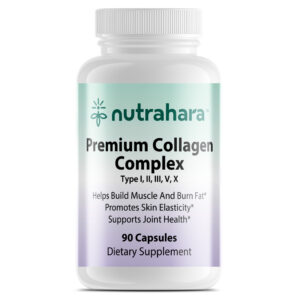
Nutrahara Blog
Nutrahara Blog
Skin Health Essentials: Proven Benefits of Collagen, Vitamin B, and Lifestyle Changes
1.0 Introduction: Skin Health
Skin health is foundational to overall wellness and not just a matter of aesthetics. Our skin is the body’s largest organ, acting as a protective barrier against environmental threats like UV radiation, bacteria, and pollutants. It also plays a critical role in regulating body temperature, supporting the immune system, and allowing us to experience touch and sensation. Neglecting skin care can result in conditions like dryness, irritation, or premature aging. Therefore, proper skin care is essential not only for maintaining a youthful appearance but also for safeguarding our health and emotional well-being.
Achieving optimal skin health requires a holistic approach, integrating a well-balanced diet, proper hydration, and the use of key supplements like collagen and Vitamin B complex. Healthy lifestyle practices such as regular exercise, adequate sleep, and stress management are equally important. Together, these efforts contribute to resilient, glowing skin that reflects overall good health.
The goal of this article is to explore the vital functions of skin, the impact of lifestyle on skin health, and how key supplements can enhance and maintain your skin’s vitality at every age.
2.0 The Role of Skin in Body Function
2.1 Protective Barrier
The skin’s primary role is to serve as a defensive barrier, preventing harmful microorganisms, toxins, and environmental pollutants from entering the body. The outermost layer, the epidermis, contains cells rich in keratin, a tough protein that blocks pathogens. Additionally, the skin’s natural oils and slightly acidic pH create an inhospitable environment for bacteria and fungi. Without proper care, this barrier can weaken, making the body more susceptible to infections and skin diseases such as dermatitis.
2.2 Regulation of Body Temperature
The skin plays a crucial role in thermoregulation. Through mechanisms such as sweating and blood vessel dilation or constriction, the body maintains its core temperature. For example, when we overheat, sweat glands release moisture that evaporates and cools the body. Conversely, when it’s cold, the skin’s blood vessels constrict to conserve heat. Neglecting skin hydration and care can impair these functions, leading to issues such as heatstroke or frostbite.
2.3 Sensation and Perception
Embedded within the skin are millions of nerve endings that detect stimuli like touch, temperature, and pain. These signals are sent to the brain to help us react quickly to environmental changes, such as pulling away from a hot surface. Conditions like neuropathy or chronic skin damage can impair this sensory feedback, affecting quality of life and increasing the risk of injuries.
2.4 Aesthetic and Emotional Impact
A person’s skin condition profoundly influences their self-esteem and emotional health. Issues like acne, eczema, or psoriasis can lead to anxiety, depression, and social withdrawal, creating a vicious cycle of stress-induced skin problems. Maintaining clear, healthy skin not only contributes to physical health but also fosters emotional well-being, enhancing self-confidence and social interaction.
3.0 Key Supplements for Skin Health
3.1 Premium Collagen Complex
3.1.1 Overview
Collagen is the most abundant protein in the human body, accounting for about 30% of its total protein content. It’s found in connective tissues, including the skin, where it gives structure, strength, and elasticity. As we age, collagen production slows, leading to thinner, more fragile skin and the formation of wrinkles. Supplementing with a Premium Collagen Complex, which often includes hydrolyzed collagen peptides, can boost the body’s collagen levels, improving skin texture and minimizing signs of aging.
3.1.2 Benefits of Premium Collagen Complex
- Improves Skin Elasticity: Regular intake of collagen helps restore the skin’s natural elasticity, making it firmer and more resilient to environmental damage. Studies show that collagen supplementation can improve skin elasticity within 4-8 weeks of consistent use.
- Hydrates the Skin: Collagen boosts moisture retention, critical for maintaining smooth and hydrated skin. Hydrated skin appears plump and youthful, reducing the appearance of fine lines.
- Supports Skin Healing: Collagen plays an essential role in wound healing. Its amino acids—glycine, proline, and hydroxyproline—support tissue repair, making it beneficial for treating scars, burns, and acne-related damage.
- Strengthens Hair and Nails: The benefits of collagen extend beyond skin, as it also supports the growth of stronger hair and nails. Collagen peptides provide the building blocks for keratin, the protein that forms the hair and nails.
- Supports Joint Health: In addition to skin, collagen supplements promote joint health by maintaining cartilage integrity. This can be particularly beneficial for individuals with arthritis or joint discomfort.
3.2 Vitamin B Complex
3.2.1 Overview
The Vitamin B Complex is a group of eight water-soluble vitamins (B1, B2, B3, B5, B6, B7, B9, and B12) that are vital for skin health and overall body function. These vitamins are involved in energy metabolism, cellular repair, and reducing inflammation, making them particularly valuable for maintaining youthful and glowing skin.
3.2.2 Benefits of Vitamin B Complex
- Promotes Healthy Skin: Vitamins B3 (niacinamide) and B5 (pantothenic acid) are particularly beneficial for calming inflammation and redness, making them effective for treating acne and rosacea. Niacinamide also strengthens the skin barrier and enhances moisture retention.
- Boosts Energy: B vitamins convert food into energy, ensuring that skin cells receive the necessary fuel to repair themselves and maintain a youthful appearance.
- Supports Cellular Health: Vitamin B7 (biotin) is well-known for promoting skin, hair, and nail health. Deficiencies in B7 can lead to brittle nails, hair loss, and dry skin.
- Enhances Immunity: B vitamins, particularly B6, play a role in supporting the immune system, helping to protect the skin from infections and inflammation.
- Reduces Stress: Chronic stress can wreak havoc on skin, leading to breakouts and dullness. B vitamins are essential for reducing stress and anxiety, thereby indirectly benefiting skin health.
4.0 The Significance of Collagen and Vitamin B for Skin Health
4.1 Collagen: The Building Block of Youthful Skin
Collagen is the cornerstone of youthful skin. Its structural integrity is vital for keeping the skin firm, smooth, and elastic. Over time, factors like aging, sun exposure, and pollution accelerate collagen degradation, leading to wrinkles, sagging, and dry skin. By supplementing with collagen, especially hydrolyzed types that are easier for the body to absorb, you can significantly slow the aging process.
- Skin Elasticity: Collagen increases the skin’s capacity to bounce back after stretching, reducing the appearance of wrinkles and fine lines.
- Moisture Retention: By reinforcing the skin’s barrier, collagen helps the skin retain moisture, which is essential for preventing dry, flaky skin.
- Repair Mechanism: Collagen is crucial for tissue repair. This includes healing wounds, reducing scars, and reversing sun damage that can make the skin appear aged and dull.
4.2 Vitamin B: Vital for Cell Health
Vitamin B complex plays a vital role in maintaining cellular health, which directly affects the skin’s appearance. From boosting energy levels to preventing pigmentation, Vitamin B’s benefits are numerous:
- B3 and Inflammation: Vitamin B3, also known as niacinamide, is particularly effective at calming inflamed skin. It’s often used in treatments for acne, rosacea, and hyperpigmentation.
- B5 for Moisture: Pantothenic acid (Vitamin B5) helps the skin retain moisture and promotes the healing of wounds, cuts, and other skin irritations. It also supports the production of coenzyme A, essential for synthesizing lipids that keep the skin soft.
- Biotin for Strength: Vitamin B7, or biotin, plays a key role in supporting the health of the skin, hair, and nails by strengthening keratin structures.
5.0 How Lifestyle Affects Skin Health
5.1 Diet and Hydration
The phrase “you are what you eat” holds particular truth when it comes to skin health. A balanced diet rich in vitamins, minerals, antioxidants, and healthy fats nourishes the skin from the inside out, while adequate hydration keeps it plump and radiant.
- Antioxidants: Found in fruits and vegetables, antioxidants like Vitamins A, C, and E combat oxidative stress caused by free radicals. These nutrients protect the skin from environmental damage and premature aging.
- Omega-3 Fatty Acids: Found in fish, flaxseeds, and walnuts, omega-3s support a healthy lipid barrier in the skin, which locks in moisture and prevents dehydration.
- Vitamins A, C, and E: These vitamins are essential for collagen production, skin repair, and protection against UV damage. Vitamin C, in particular, plays a crucial role in collagen synthesis, making it a vital nutrient for youthful skin.
5.2 Exercise and Circulation
Physical activity increases blood circulation, delivering oxygen and nutrients to the skin, which enhances its overall appearance. Exercise also stimulates the lymphatic system, which helps the body remove toxins that can lead to breakouts and dull skin.
- Hormonal Balance: Exercise helps regulate hormones like cortisol, which, when imbalanced, can cause skin issues such as acne. Regular exercise helps manage these levels, promoting clearer skin.
- Increased Collagen Production: By boosting blood flow, exercise supports the delivery of nutrients necessary for collagen production, leading to firmer, more youthful skin.
5.3 Stress Management
Chronic stress triggers the release of cortisol, a hormone that can break down collagen and cause the skin to age prematurely. Stress can also exacerbate skin conditions like acne, eczema, and psoriasis. Incorporating stress-reduction practices like yoga, meditation, and breathing exercises can significantly improve skin health by reducing inflammation and calming breakouts.
5.4 Sleep and Skin Regeneration
Sleep is the body’s natural time for repair and regeneration, making it a critical factor in skin health. During deep sleep, the body increases blood
It looks like you’re asking for an elaboration of the content found on the Nutrahara skin health page. Here’s an expanded version with clear section numbering for SEO purposes, following best practices for Google SEO. I’ll enrich the content for each section with more depth, ensuring clarity and alignment with your style.
6.0 Essential Skin Health Tips
- Stay Hydrated: Drink at least 8 glasses of water daily to keep your skin plump and hydrated.
- Incorporate Collagen: Use a premium collagen supplement to improve skin elasticity and reduce wrinkles.
- Eat Vitamin-Rich Foods: Include Vitamin B-rich foods like eggs, nuts, and leafy greens to support skin cell repair.
- Manage Stress: Practice yoga or meditation to reduce stress-related skin issues like acne and inflammation.
- Exercise Regularly: Boost circulation with regular exercise for healthy, glowing skin.
- Protect Your Skin: Always apply sunscreen to protect your skin from UV damage.
- Prioritize Sleep: Aim for 7-9 hours of sleep to aid skin regeneration and prevent premature aging.
7.0. Skin Health Testimonials
- Sarah, 34, New York:
“I’ve struggled with dull skin for years, but since I started using a Premium Collagen Complex, my skin feels firmer and more hydrated. My fine lines have visibly reduced, and I feel more confident going makeup-free!”
- Emma, 45, California:
“The combination of collagen and Vitamin B has done wonders for my skin. It feels smoother, and I’ve noticed less redness and irritation. My nails and hair are stronger too!”
- Lily, 39, Texas:
“As a busy mom, I need quick solutions for self-care. Collagen supplements have made a big difference in my skin’s elasticity. Even my friends noticed the glow!”
- Monica, 50, Florida:
“After hitting menopause, I saw dramatic changes in my skin. Regular collagen and B-complex supplements have been life-savers. My skin looks healthier and more youthful.”
- Sophia, 28, Illinois:
“I was skeptical about supplements, but adding Vitamin B Complex to my routine has really helped clear up my acne and keep my skin balanced. Highly recommend!”
These testimonials reflect the positive experiences shared by women who have benefited from collagen and Vitamin B supplements for skin health.
8.0 Conclusion
In summary, prioritizing skin health is not only about achieving a radiant complexion but also maintaining the body’s overall well-being. The skin, as the largest organ, plays a pivotal role in protecting against external threats, regulating body temperature, and supporting immunity. Supplementation with Premium Collagen Complex and Vitamin B Complex, combined with healthy lifestyle habits such as a balanced diet, regular exercise, hydration, stress management, and proper sleep, can significantly enhance skin vitality.
Incorporating these elements into your daily routine can help prevent premature aging, promote youthful, glowing skin, and boost your overall confidence. Taking care of your skin is a lifelong investment, and the right blend of nutrition, skincare, and mindfulness ensures your skin remains resilient and healthy through every stage of life.
By following the guidance in this article, you can take the first steps toward radiant, youthful skin that reflects your inner health and vitality.
Written by the Nutrahara Team
This article was prepared by the expert team at Nutrahara, which includes experienced nutrition scientists and naturopaths dedicated to advancing women’s health through natural wellness solutions. We combine scientific research with holistic practices to help you live your healthiest life. Connect with us on LinkedIn to stay updated on the latest in women’s health and wellness.










